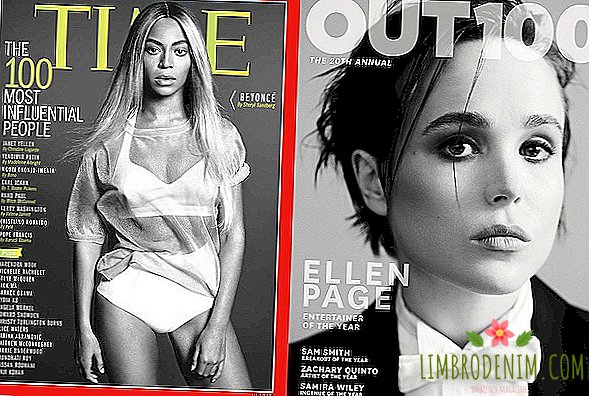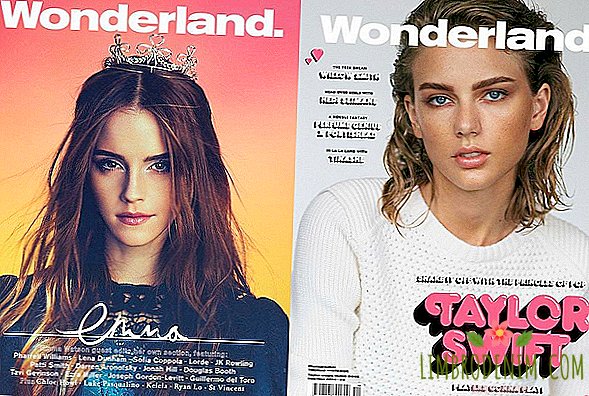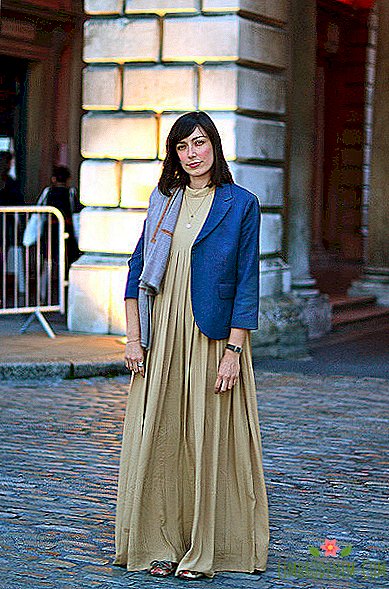Sick Question: How the stars promoted ideas of feminism in 2014
The year is ending: today we summed up the results in pop culture, recalling the main milestones of 2014. One of them was the mass march of feminism around the planet, which also became the focus of the entertainment industry. No matter how it sounded, feminism became the trend of the year - and it's time to figure out how it happened and what it means for all of us.

The nature and scope of the women's rights movement have changed more than once since its inception, but one thing is for sure - among its supporters there have never been so many stars as now. Not that it was bad: on the one hand, we continue to wait for revelations from the mouth of the rich and famous, on the other - any phrase can be heard and absorbed by millions. However, now the position of public figures on the part of feminism has finally left the zone of their personal preferences and turned out to be an indicator for public approval or censure.
For actors and musicians of the first echelon, the position on feminism was partly a matter of image and proper PR. So, besides personal views, there was a question about which layer of the public to appeal in order to keep the rating. Modernity, unfortunately, compels us to occupy ideologically extreme positions in sensitive issues, and those who can not be determined in any way are quite quickly written off. However, it is too early to talk about the unambiguously positive trend that has emerged. Half of the celebrities who mentioned feminism were not quite for, or even against.

As a result of numerous misunderstandings, the word on “F” became almost abusive.

Many people, not facing radical manifestations of sexual discrimination and not thinking about problems outside their daily life, find themselves in a bubble of everyday indifference, guided only by their empirical experience. Movie stars, whose lives and opinions strangely continue to hypnotize others, talk about feminism in the same way as most "mere mortals" - to the extent of their own knowledge and understanding of the issue, no more and no less.
As a result of numerous misunderstandings, the word “F”, as they now like to call it, drawing an analogy with the use of another “forbidden” English word for this letter, has become almost an abusive one. The reason for this is negative connotations that have flourished on the basis of prejudice and intolerance - as well as a craving for decisive rash denial instead of thoughtful critical thinking. After all, many (and celebrities are no exception), who do not want to consider themselves feminists and feminists, successfully exist in a world that would be impossible without feminism - they simply do not think about it. Or they support feminist ideas, they simply do not know that this is the name. For example, the clever Shailene Woodley would not hurt to look into the encyclopedia, and then in her replica "No, I'm not a feminist, but I am beyond the balance of power between men and women" there would be no logical contradiction.

Such misconceptions also feed the media that have been fascinated by ideological wars (recall the battle for the shirt). Even educated people from TIME may suddenly release material with the mistaken idea that feminism discriminates men, more like a joke from a humorous twitter stupid_feminism. They also came up with a funny poll “What word should be banned in 2015?”, Where “feminism” was on a par with “om nom nom nom” and “yaaasssss”, because of which the editor later had to apologize. It is not surprising that pop stars begin or continue to deny themselves from feminism - both unknowingly and consciously. CEO Yahoo! Marissa Mayer does not like being called a feminist, although all her achievements scream the opposite, and her career as a whole would have been impossible without the former victories of the movement. At the same time Mayer is a woman of incredible intelligence and an iron grip, who is well aware of her words. So, the way she speaks about herself in public is a matter of her personal choice, aimed at shaping a certain image.
However, not all approach the issue so thoughtfully. In 2012, Katy Perry, to put it mildly, surprised many in an interview with Billboard, saying that she did not consider herself a feminist. It looked at least inconsistent, if you remember how sarcastic over hypersexualization of the female body was her bra with cupcakes from "California Gurls". Whatever the singer had in mind, this year the emphasis for her shifted. She still has not fully understood what feminism is and what it means to her personally, but at least her self-identification has become different. Now Katie refuses to be a factory for the production of children and asks to stop trying to get into her ovaries.

The evolution of views is a natural process, and there is nothing to worry about seeing the question from a new angle, even if you are a superstar.

This year, she “changed her mind” not only Katy Perry (either on her own initiative, or on the advice of PR people). Taylor Swift made a similar breakthrough: it seems that this was partly helped by her friendship with Lorde and Lena Dunham, for whom the question of the relevance of feminism has long been resolved. Like Katy Perry, Swift was surprised a couple of years ago that she was considered a feminist, but this year she changed her mind. The young star and the voice of America showed that the evolution of views is a natural process, and there is nothing to worry about seeing the question from a new angle, even if you are a superstar. Especially if you are a superstar.
Perhaps for many, Emma Watson’s speech on equality in the UN was a good example. The same Taylor Swift admitted that she would like to hear in her 12 years such a precise, elegant and inspiring definition of feminism from the lips of her favorite actress. Horned speech Watson (by the way, written with the help of Tavi Gevinson) scattered on social networks with the hashtag #HeForShe, finally confirming the "Harry Potter" star in the voting rights of his generation. Emma is already one of the most beloved actresses due to her modesty and rare sanity, but she was almost canonized by her - both her colleagues and her fans. Cosmopolitan and Ms. Foundation for Women even chose her as the main feminist of the year to the displeasure of Jezebel - the main herald of feminism in the English-speaking world immediately reminded that ranking women somehow did not fit into the movement for their equal rights.

On the other hand, the Watson campaign is not just called #HeForShe: men, too, gradually realize that the idea of universal equality does not bring anything bad to them, and is adjacent to the movement. Previously, the main celebrity-feminist remained Ryan Gosling, however, it was first decided for him in the tumbler Feminist Ryan Gosling, running the memes with the constant beginning of "Hey Girl". In the outgoing year, Joseph Gordon-Levitt became the most popular man with feminist views, as his friend Zoya Deschanel HelloGiggles regularly reminds us of. The actor in 2014 admitted that he was not afraid to be a feminist, and by all means he draws attention to the issue.
However, not everyone is in a hurry to idealize celebrities with a similar position. One of the most frequent complaints is that the actors simply voice the problem, do nothing to solve it, and this is a dead end. Another young superstar, Macy Williams, who we all fell in love with for her strong baby Arya from Game of Thrones, argues in the same vein. The actress, who initially supported the initiative of Emma Watson, then made the reservation that all these are problems of the first world and their solution in no way helps women in less prosperous countries, where there are more pressing problems than objectification. Alas, Williams decided not to delve deeply into the essence of feminism, before saying that she disliked him. Another obstacle to the promotion of feminism lies even more on the surface: many "true" movement adherents believe that most of the stars just jumped at the fashion of feminism, exploited his ideas and have no right to be speakers of the movement.

Starlight makes any action significant, so any positive mention of equality works for the good of the cause.

Be that as it may, during the outgoing year we have witnessed many events in pop culture that could draw the attention of millions of women to the ideas that underlie the struggle for equality and problems that we all still have to sweat on. Not all the steps of the stars in this direction were such head-ons as Beyonce’s performance against the background of the huge luminous inscription "FEMINIST", but it will apparently remain the symbol of this year's "star feminism". Moreover, even at its beginning, the current queen of pop wrote an essay with the heading "Gender Equality - Myth", short and without embellishment.
The list of stars talking on important topics can go on and on. Here, and Olivia Wilde's speech criticizing inequality in Hollywood, and Cate Blanchett's speech on the Oscars, and Ellen Page coming out, who openly considers herself a feminist and delivered a touching and inspiring speech. We cannot forget Renee Zellweger’s restrained and wise reaction to discussing her appearance, and Reese Witherspoon's speech in her support. Even the leader of the Labor Party, Harriet Garman, put a T-shirt "This is what a feminist looks like" in parliament, although this also raised questions about the ethics of producing such clothes. While TIME first appeared on the cover of a transgender woman Laverne Cox.
Of course, in an ideal world everything must be coordinated and orderly, and people, supporting a certain ideology, will never perform actions contrary to it. But, fortunately, in the real world it is absolutely not necessary. So it turns out that starlight still gives additional meaning to any word and action - so any positive reference to equal rights works in their rights, benefits. And 2014 made it clear that everything will be fine as long as we have Ellen DeGeneres and Laverne Cox, Meryl Streep and Jennifer Lawrence, after all, Kim Kardashian and Miley Cyrus. After all, the reclaimed right to ride naked on a fender does not discredit feminism and does not replace other educational and political work, as Roxane Gay, the author of one of the main book bestsellers of this year, “Bad Feminist”, says.





